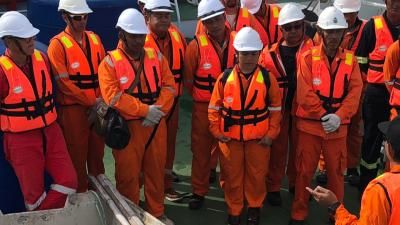
Lloyd’s Register Foundation and Occupational Safety and Health: what’s the link?
This page is approximately a 4 minute read
This page was published on

Page author
Olivia Swift, Head of Maritime Systems
Olivia is Head of Maritime Systems at Lloyd's Register Foundation. She leads the Foundation's work on the safety of maritime systems, develops partnerships, and manages areas of our maritime portfolio.
Dr. Olivia Swift, Senior Programmes Manager at Lloyd's Register Foundation discusses the link between Lloyd’s Register Foundation and Occupational Safety and Health (OSH)
About Olivia
Find out moreThe link between the Foundation and Occupational Safety and Health
Lloyd’s Register Foundation is a global charity that enhances the safety of the people and property comprising critical infrastructure in sectors such as marine, digital and food. These infrastructures involve people working in formal workplaces, such as factories, ships, offshore structures and offices. In much of the world, employers’ responsibilities for employees’ health and safety are legislated and the people implementing that legislation into workplace practice are professionals, trained in the multidisciplinary field of Occupational Safety and Health.
It would therefore be reasonable to assume that the Foudnation is a charity that supports OSH professionals - and it does: the OSH community is a vital partner in and beneficiary of much of the work we fund, which in turn improves the safety of people in their working lives.
But the Foundation's mission to engineer a safer world means attending not only to the people working in the formal workplaces of critical infrastructure but also those working in informal settings - such as subsistence fishing, ship recycling on the beaches of Bangladesh or waste-picking in Latin America - as well as the wider publics’ interactions with those infrastructures. This broad remit aligns us with aspects of the UN’s International Labour Organization and encourages us to recognise that formal workplaces aren’t independent of social context.
We know from anthropologists and from our own experience that work has a ‘dual nature’* - one connected to workers’ personal background in terms of race, ethnicity, religion, gender and generation - and the other that’s impersonal, linked to norms of production and bureaucracy.1 This means that workers don’t experience work or behave at work in a way that’s consistent or predictable. OSH professionals wouldn’t dispute this but unlike the Foundation, their starting point is the workplace and organisation, rather than the socially embedded infrastructure of which any one workplace or organisation is a node.
Among what Lloyd's Register Foundaation can offer OSH professionals is insight from this socially-embedded perspective on workplace safety, particularly at a time of rapid change linked to COVID in which a sudden rise in remote working (primarily among office workers) has blurred the previous demarcation between formal workplace and an informal space and has arguably altered what employers and employees expect of one another. The Foundation' funding of Nottingham Business School, for example, promises to result in practical insight into how organisations can embed learning from supporting employees’ psychological wellbeing during COVID, effectively, in the long-term. Another of the Foundation’s current projects researches how best to take account of context when applying OSH interventions designed for other workplaces and environments. We also have a live call (closes 13 August) for research into the role of evidence in OSH.
Perhaps chief among the insight that the Foundation can offer the OSH community is our World Risk Poll, which is the first study in which people from across the world have been asked about their experiences of, and attitudes towards, different types of risk. The poll was motivated by the awareness that the Foundation's mission to engineer a safer world requires not only a reduction in injuries and fatalities but also for people to feel safer - not least because how one feels influences how one acts (see our commissioned review of how psychological wellbeing affects safety, for example).
By showing how experiences and attitudes towards risk varies by geography and by attributes such as gender, the Poll provides OSH professionals focussed on formal workplaces with (sometimes surprising) contextual data - about where in the world women’s safety from violence and harassment at work needs particular attention, or which institutions people trust for information about risk - which helps OSH interventions to be targeted, nuanced and effective, making it possible for more people to be safer and more thriving as they go about their working lives.
To talk to us about our interest in OSH, or any other aspect of this blog, please get in touch: info@lrfoundation.org.uk.
Disclaimer: all blogs featured are the views of the author and not representative of Lloyd's Register Foundation.
- 1
Massimiliano Mollona (2009) ‘General Introduction’ in Industrial Work and Life: An Anthropological Reader, M. Mollona, G. de Neve and J. Parry (eds). Oxford: Berg.

